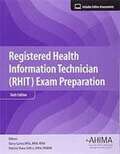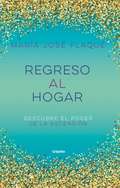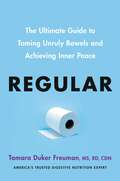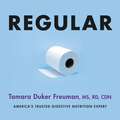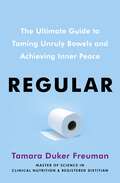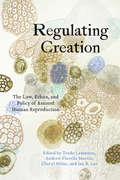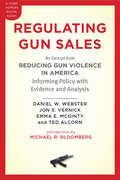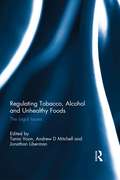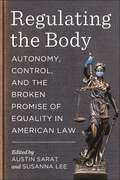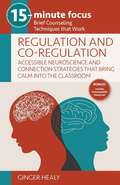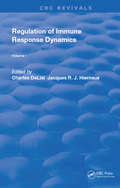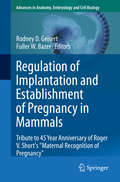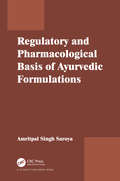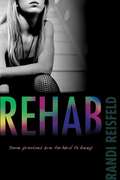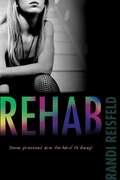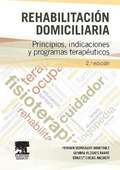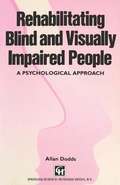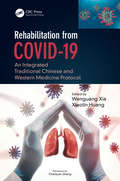- Table View
- List View
Registered Health Information Technician (RHIT) Exam Preparation Sixth Edition
by Darcy Carter Patricia ShawConfidently prepare for the RHIT exam with Registered Health Information Technician (RHIT) Exam Preparation. The exam experience is simulated in this textbook with 850 multiple choice questions, including two complete practice exams based on the RHIT competency statements. Whether you're still learning or ready to test your skills immediately, RHIT Exam Preparation will help prepare you for exam day.
Registered Health Technician (RHIT) Exam Preparation, Fifth Edition
by Darcy Carter Patricia ShawThis book contains 550 multiple choice practice questions and two complete practice exams of 150 questions each that are organized by the RHIT domains.
Regreso al hogar
by Maria José FlaquéEl nuevo libro de María José Flaqué autora de SOY UNA MUJER HOLÍSTICA y UNA NUEVA REALIDAD. Gracias al movimiento de Mujer Holística, la autora best seller María José Flaqué ha contribuido a transformar la vida de miles de mujeres alrededor del mundo, que hoy viven en sintonía y en armonía con su realidad. Pero el proceso no ha terminado. Estás a punto de iniciar un camino que Flaqué recorrió a lo largo de estos años y que ahora quiere compartir contigo. Ha llegado el momento de conocer el poder de la ascensión y de comprobar que en realidad está al alcance de todas. Pero ¿qué es la ascensión? ¿Por qué las líderes espirituales están integrando esta enseñanza en sus procesos de evolución? Descúbrelo en este libro a través de 21 activaciones energéticas, que te llevarán a alcanzar un bienestar máximo, desarrollar diferentes áreas de tu vida, aumentar tus niveles de protección y encontrar tu propósito divino.
Regular: The Ultimate Guide to Taming Unruly Bowels and Achieving Inner Peace
by Tamara Duker FreumanAmerica's Trusted Digestive Nutrition Expert reveals the many causes of irregularity, with tailored solutions for a dozen common—and some lesser-known—issues, including Irritable Bowel Syndrome (IBS), Pelvic Floor Dysfunction, Malabsorption, Inflammatory Bowel Disease (IBD) and Histamine Intolerance. Belly bloat, diarrhea, constipation, and irritable bowels may not seem like the sexiest topics—but they still affect millions of Americans every year. Rather than focusing on a single one-size-fit-all approach to restoring bowel regularity, Regular aims to help readers identify the likely cause of their irregular bowel patterns and offers a wide variety of personalized solutions. For example, Freuman explains that while a high fiber diet that might help someone with slow transit constipation, it could make symptoms worse for someone constipated as the result of pelvic floor muscle dysfunction. Regular will guide readers to narrow down the specific cause of their irregularity and provide tips, including: questions to take to your next doctors visit; tables listing foods likely to be problematic and suggested alternatives; sample menus for different therapeutic diets; and foods and supplements that may be helpful for specific types of diarrhea and constipation. Whether you are dealing with chronic diarrhea or constipation, Regular will cover a dozen of the most common causes of bowel irregularity with detailed descriptions of their presentations that a sufferer should recognize, including: Irritable Bowel Syndrome (IBS) Lactose, Fructose and Sucrose Intolerances Malabsorptive conditions, including SIBO, Bile Acid Malabsorption, Celiac Disease and Pancreatic Insufficiency Histamine Intolerance Inflammatory Bowel Disease (Crohn's disease and Ulcerative Colitis) Pelvic Floor Dysfunction
Regular: The ultimate guide to taming unruly bowels and achieving inner peace
by Tamara Duker FreumanAn essential guide to irritable bowels, constipation and other gut issues.In Regular, Tamara Duker Freuman tackles this less than glamorous topic, and offers tailored solutions for the most common and uncommon issues, including irritable bowel syndrome, reflux and Coeliac disease. Regular will guide readers to identify the specific cause of their irregularity and provide personalized solutions and tips, including: -questions to take to your next doctor's visit -info and data such as listing problematic foods and suggested alternatives-sample menus, and more.(P) 2023 Hachette Audio
Regular: The ultimate guide to taming unruly bowels and achieving inner peace
by Tamara Duker FreumanWe know that gut health is key to our wellbeing so it's high time we break the taboos and get familiar with our poo!In Regular, digestive health expert and medical nutritionist Tamara Duker Freuman tackles this less than glamorous topic and teaches you all you need to know about your bowel health. Offering tailored solutions for the most common - and uncommon - issues, including irritable bowel syndrome, reflux and Coeliac disease, this book will guide readers to identify the specific cause of their irregularity and provide personalised solutions and tips, including:-questions to take to your next doctor's visit-an interactive quiz that will help you identify the quality of your stool -tables and charts listing problematic foods and suggested alternatives-sample menus, and more.Whether you or a loved one suffers from chronic diarrhoea or constipation, Regular covers the most common causes of bowel irregularity with detailed descriptions of their presentations that a sufferer should recognise, including: fructose, lactose, and sucrose intolerances histamine intolerance inflammatory bowel diseases (IBD), such as Crohn's disease and ulcerative colitis irritable bowel syndrome (IBS) malabsorptive conditions, such as bile acid malabsorption (BAM), celiac disease, pancreatic insufficiency, and small intestinal bacterial overgrowth (SIBO) and pelvic floor dysfunction
Regulating Creation: The Law, Ethics, and Policy of Assisted Human Reproduction
by Andrew Flavell Martin Cheryl Milne Ian B. Lee Trudo LemmensIn 2004, the Assisted Human Reproduction Act was passed by the Parliament of Canada. Fully in force by 2007, the act was intended to safeguard and promote the health, safety, dignity, and rights of Canadians. However, a 2010 Supreme Court of Canada decision ruled that key parts of the act were invalid. Regulating Creation is a collection of essays built around the 2010 ruling. Featuring contributions by Canadian and international scholars, it offers a variety of perspectives on the role of law in dealing with the legal, ethical, and policy issues surrounding changing reproductive technologies. In addition to the in-depth analysis of the Canadian case the volume reflects on how other countries, particularly the U.S., U.K. and New Zealand regulate these same issues. Combining a detailed discussion of legal approaches with an in-depth exploration of societal implications, Regulating Creation deftly navigates the obstacles of legal policy amidst the rapid current of reproductive technological innovation.
Regulating Gun Sales: An Excerpt from Reducing Gun Violence in America, Informing Policy with Evidence and Analysis
by Ted Alcorn Daniel W Webster Jon S Vernick Emma E McGintyThis excerpt from the “masterful, timely, data-driven” study of the gun control debate examines the potential of stronger purchasing laws (Choice).As the debate on gun control continues, evidence-based research is needed to answer a crucial question: How do we reduce gun violence? One of the biggest gun policy reforms under consideration is the regulation of firearm sales and stopping the diversion of guns to criminals. This selection from the major anthology of studies Reducing Gun Violence in America presents compelling evidence that stronger purchasing laws and better enforcement of these laws result in lower gun violence.Additional material for this edition includes an introduction by Michael R. Bloomberg and Consensus Recommendations for Reforms to Federal Gun Policies from the Johns Hopkins University.
Regulating Lifestyle Risks
by Alberto Alemanno Amandine GardeThis collection of essays looks at the role the European Union could and should play in promoting healthier lifestyle, in light of the moral, philosophical, legal and political challenges associated with the regulation of individual choices. By tackling the main non-communicable diseases (NCD) risk factors (tobacco consumption, harmful use of alcohol, unhealthy diets and lack of physical activity), the contributors endeavour to identify common themes and determine whether and, if so, to what extent the lessons learned in relation to each area of EU intervention could be transposed to the others. By focusing on the European Union legal order, the book highlights both the opportunities that legal instruments offer for NCD prevention and control agenda in Europe, as well as the constraints that the law imposes on policy-makers.
Regulating Long-Term Care Quality
by Anna Maresso Vincent Mor Tiziana LeoneThe number of elderly people relying on formal long-term care services is dramatically increasing year after year, and the challenge of ensuring the quality and financial stability of care provision is one faced by governments in both the developed and developing world. This edited book is the first to provide a comprehensive international survey of long-term care provision and regulation, built around a series of case studies from Europe, North America and Asia. The analytical framework allows the different approaches that countries have adopted to be compared side by side and readers are encouraged to consider which quality assurance approaches might best meet their own country's needs. Wider issues underpinning the need to regulate the quality of long-term care are also discussed. This timely book is a valuable resource for policymakers working in the health care sector, researchers and students taking graduate courses on health policy and management.
Regulating Tobacco, Alcohol and Unhealthy Foods: The Legal Issues
by Andrew D. Mitchell Tania Voon Jonathan LibermanThe need to reduce disability and premature deaths from non-communicable diseases (NCDs) is increasingly engaging international organisations and national and sub-national governments. In this book, experts from a range of backgrounds provide insights into the legal implications of regulating tobacco, alcohol and unhealthy foods, all of which are risk factors for NCDs. As individual countries and the international community move to increase targeting of these risk factors, affected industries are turning to national and international law to challenge the resulting regulations. This book explores how the effective regulation of tobacco, alcohol and unhealthy foods can be achieved within the context of international health law, international trade and investment law, international human rights law, international intellectual property law, and domestic laws on constitutional and other matters. Its contributors consider the various tensions that arise in regulating NCD risk factors, as well as offering an original analysis of the relationship between evidence and health regulation. Covering a range of geographical areas, including the Americas, the European Union, Africa and Oceania, the book offers lessons for health and policy practitioners and scholars in navigating the complex legal fields in which the regulation of tobacco, alcohol and unhealthy foods takes place.
Regulating the Body: Autonomy, Control, and the Broken Promise of Equality in American Law
by Austin Sarat Susanna LeeHow legal regulation of the body is practiced and justifiedRegulating the Body examines the practice of legal regulation of the body and how it has been justified. The essays in this anthology trace the ideological, moral, and religious arguments for increasing the reach of regulation and authorizing punishment for infractions.Bringing together leading scholars in the law and humanities, this volume examines the practices and discourses used to regulate the body, concentrating on scenarios where ethical and legal inconsistencies abound. The regulations examined herein range from the sale of gametes, parental rights over children’s genetic information, debates about masking, discourse regarding vaccines and abortion, anti-transgender legislation, and the control of inmates’ bodies on death row. These are situated within a cultural and political environment that values regulation and punishment over our long-standing constitutional protections. At a time where rhetoric around regulation of the body is becoming increasingly incendiary, Regulating the Body reveals worsening legal hypocrisies and unmasks the threats to both personal autonomy and the claims of law itself.
Regulation and Co-Regulation: Accessible Neuroscience and Connection Strategies that Bring Calm into the Classroom
by Ginger HealyTackling this critical aspect of learning head-on, 15-Minute Focus: Regulation and Co-Regulation holds out unapologetic hope for healing. As you absorb and apply the wisdom within these pages, get ready: a domino effect will begin when you embrace a new lens of thinking and responding. Everyone in your life - including you - will benefit from the tools you employ to make co-regulation a consistent reality for your students.
Regulation of Immune Response Dynamics: Volume 1 (Routledge Revivals)
by Charles DeLisi Jacques R. J. HiernauxFirst published in 1982: This book has been divided into two volumes; the first focusing primarily on auto-anti-idiotic regulation, and the second primarily on T cell regulation.
Regulation of Implantation and Establishment of Pregnancy in Mammals
by Rodney D. Geisert Fuller W. BazerOver the past few decades technological advances in transcriptomics, proteomics, metabolomics, and glycomics along with the ability to selectively knockout genes of interest has greatly advanced our understanding of maternal-conceptus interactions that are essential for the establishment and maintenance of a successful pregnancy. This knowledge provides a foundation from which to build research endeavors to help resolve infertility, embryonic loss and recurrent abortion in humans, captive wild animals and important farm species. The present volume on "Regulation of Implantation and Establishment of Pregnancy in Mammals" brings together current reviews from leading experts to address the diversity of mechanisms by which species establish and maintain pregnancy. Implantation in rodents, dogs, pigs, cattle, sheep, horses, primates, humans and embryonic diapause in wild species are discussed. Reviews will provide current knowledge on the role of endometrial steroid receptors, adhesion factors, cytokines, interferons, steroids, prostaglandins, growth factors and immune cells involved with regulation of conceptus development.
Regulatory and Pharmacological Basis of Ayurvedic Formulations
by Amritpal SinghRegulatory affairs and pharmacological drug safety issues of Ayurvedic medicine has been overlooked by practitioners for many years. Research in Ayurveda is now a world-wide phenomenon, and several large pharmaceutical corporations are investing money for novel drug discovery from Ayurvedic sources. This book examines the regulatory and pharmacological aspects and includes extensive data on scientific evaluation carried out on Ayurvedic formulations. It will also serve as a reference book on standardization, pre-clinical studies, and clinical and toxicological studies on Ayurvedic formulations.
Rehab
by Randi ReisfeldKenzie Cross never thought she'd vault to insta-fame on the hit TV action drama Spy witness Girls. virtual unknown, she's the show's breakout star -- and the lead in a major new movie.
Rehab
by Randi ReisfeldKenzie Cross never thought she'd vault to insta-fame on the hit TV action drama Spywitness Girls. A virtual unknown, she's the show's breakout star -- and the lead in a major new movie. It's like it's Christmas and her birthday every day, and Kenzie has every reason to let loose and party hard, especially after nonstop press interviews, photo shoots, publicity, and promotion. But when her partying goes a little too far, Kenzie is given an ultimatum by her director: Go to rehab, or get cut from the film. Kenzie agrees to the stint and really kind of enjoys her posh quarters, not to mention her daily swim, her horseback-riding lessons, and her private massages, which are all part of her "therapy." But then it finally hits her why she's really there, and she begins to wonder if she's even ready to leave....
Rehab
by Randi ReisfeldKenzie Cross never thought she'd vault to insta-fame on the hit TV action drama Spywitness Girls. A virtual unknown, she's the show's breakout star -- and the lead in a major new movie. It's like it's Christmas and her birthday every day, and Kenzie has every reason to let loose and party hard, especially after nonstop press interviews, photo shoots, publicity, and promotion. But when her partying goes a little too far, Kenzie is given an ultimatum by her director: Go to rehab, or get cut from the film. Kenzie agrees to the stint and really kind of enjoys her posh quarters, not to mention her daily swim, her horseback-riding lessons, and her private massages, which are all part of her "therapy." But then it finally hits her why she's really there, and she begins to wonder if she's even ready to leave....
Rehabilitación domiciliaria: Principios, indicaciones y programas terapéuticos (Spanish Edition)
by Ferran Montagut Martínez Gemma Flotats Farré Ernest Lucas AndreuNueva edición de una obra original y novedosa que aborda la rehabilitación física de los pacientes desde un nuevo escenario, el domicilio del paciente. <P><P>Aporta a todos los profesionales de la atención domiciliaria y la rehabilitación un enfoque global basado en una perspectiva integral y multidisciplinar justo en un momento en el que la tendencia al Home Care está experimentando un gran crecimiento en todo el mundo. <P><P>Se mantiene la estructura y el planteamiento de la anterior edición, aunque el contenido de algunos capítulos se fusiona para dar lugar a 4 nuevos capítulos. <P><P>Algunos de los nuevos temas tratados en esta edición son la rehabilitación del enfermo crónico a domicilio, la rehabilitación de pacientes con enfermedades raras, la tele-rehabilitación y la evidencia científica en el ámbito de la rehabilitación domiciliaria. Obra escrita por destacados profesionales en la materia con perfiles sanitarios muy distintos, pero todos ellos involucrados en la asistencia domiciliaria del paciente enfermo. <P><P>Dirigida a los profesionales de la rehabilitación en su conjunto: médicos rehabilitadores, fisioterapeutas, terapeutas ocupacionales, así comom a todos los profesionales de la atención domiciliaria. <P><P>Nueva edición actualizada de esta original y novedosa obra que aborda la rehabilitación física de los pacientes desde un nuevo escenario, el domicilio del paciente. <P><P>Obra que acumula 25 años de experiencia de su autor, con más de 300.000 pacientes tratados en su domicilio y aporta a todos los profesionales de la atención domiciliaria y la rehabilitación un enfoque gloal basado en una perspectiva integral y multidisciplinar justo en un momento en el que la tendencia al Home Care está experimentando un gran crecimiento. <P><P>Algunos de los nuevos temas tratados en esta edición son la rehabilitación del enfermo crónico a domicilio, la rehabilitación de pacientes con enfermedades raras, la tele-rehabilitación y la evidencia científica en el ámbito de la rehabilitación domiciliaria.
Rehabilitating Blind and Visually Impaired People: A Psychological Approach
by Allan DoddsDrawing on examples from a range of sensory and physical disabilities, this book emphasizes the importance of treating people individually, based on consideration of their psychological strengths and weaknesses as well as physical functioning. Written for workers with visually impaired people, this book is equally accessible to students and qualified workers, including rehabilitation workers, O & M specialists, occupational therapists, social workers and psychologists. Students and workers should find the language easy to understand and largely non-technical.
Rehabilitation Consultant's Handbook
by Roger O. Weed Timothy F. FieldThe Rehabilitation Consultants Handbook is completely updated with fresh ideas, illustrations and references. A must resource for the present rehabilitation professional, the Handbook covers important topics such as: case preparation, expert work, transferability, labor market access, life care planning, lost earning capacity, and much more. The appendices are loaded with vital references and data that will serve the professional as a primary source of information in future case development. This resource has been revised and updated over the last 18 years and has become a standard reference for private sector rehabilitation.
Rehabilitation Teaching For Persons Experiencing Vision Loss
by Wilma Inkster Linda Newman Diane Storm-Weiss Anne YeadonThis textbook intended for Rehab. Professionals outlines in sequential steps and objectives tasks of daily living and Independent completion of tasks from cooking and kitchen safety, to clothing care, to applying cosmetics.
Rehabilitation from COVID-19: An Integrated Traditional Chinese and Western Medicine Protocol
by Wenguang Xia, Xiaolin Huang and Chanjuan ZhengThe COVID-19 pandemic is unlike anything the world has ever seen before. Its reach is wide, and its effects have been debilitating. Understanding this particular strain of the coronavirus and knowing the best ways to recover are more important than ever. Rehabilitation from COVID-19: An Integrated Traditional Chinese and Western Medicine Protocol contains basic knowledge about COVID-19, including its etiology, pathogenesis, and treatment both in traditional Chinese medicine and Western medicine. It also includes relative assessment and rehabilitation targeting residual dysfunctions due to COVID-19, such as pulmonary dysfunction, mental disorders, and malnutrition, among others. Key Features Presents a new concept of CRN (COVID-19 Rehabilitation Unit) that will protect patients and medical workers Emphasizes special management of rehabilitation procedures under COVID-19 conditions Includes home-based rehabilitation tactics Provides assessment scales to help patients self-evaluate Based on clinical experience from experts, this text has been compiled by those on the frontline against COVID-19 in Wuhan. Rehabilitation from COVID-19 is an informative collection that will be helpful to patients and medical workers alike.
Rehabilitation in Movement Disorders
by Robert Iansek Meg E. MorrisMovement disorders affect a growing patient population, but providing comprehensive care is extremely difficult. Several of these conditions are progressive and incurable; the basal ganglia has a complex role in movement control, with many potential malfunctions. This book focuses on rehabilitation approaches that have been developed and utilized internationally in an attempt to minimize impairment and maximize participation amongst these patients. Each chapter is written by movement disorder experts, rehabilitation specialists and health care professionals, giving a broad overview of current interventions and emphasizing the need for interdisciplinary management, focussing on deliverable outcomes. Common conditions such as Parkinson's disease, cerebral palsy, dystonia and Huntington's disease are comprehensively covered. This book gives neurologists, geriatricians and rehabilitation specialists an up-to-date, theoretically-based approach to managing movement disorders related to basal ganglia malfunction. Also valuable for physiotherapists, occupational therapists, speech pathologists, nurses and social workers seeking to develop and plan appropriate interventions.
